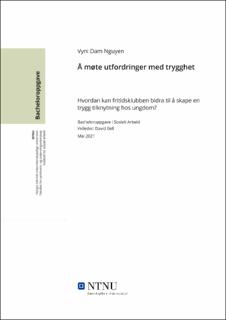Å møte utfordringer med trygghet
Bachelor thesis
Date
2021Metadata
Show full item recordCollections
- Institutt for sosialt arbeid [1394]
Abstract
I løpet av et liv møter vi på en del utfordringer. Måten vi håndterer disse utfordringene på avhenger av tilknytningsmønsteret vårt. Ungdom som har vokst opp med utilgjengelige omsorgspersoner utvikler et utrygt tilknytningsmønster, enten i form av ambivalent eller unnvikende tilknytning. Utrygt tilknyttede ungdom møter utfordringer i større grad med å bli stressa, fortvilet eller med å føle seg truet. Dette kan føre til psykiske helseplager og hindre forutsetningene for et godt liv i voksen alder. Fritidsklubben er en av de mest besøkte fritidsarenaene, og har et stort potensial til å jobbe med å skape trygg tilknytning hos ungdom. Gjennom tilknytningsteorien skal jeg se på mulighetene og begrensningene fritidsklubben som kontekst har for å kunne gi gode relasjonelle erfaringer. I dette spiller de ansatte, de jevnaldrende og fritidsklubbens kultur en stor rolle. Throughout a lifetime we will encounter on many challenges. Our attachment pattern will determine how we cope with these challenges. Youth who experience unavailable caregivers are in danger of developing unsecure attachment pattern, either in the form of attachment anxiety or attachment avoidance. When meeting challenges, the common way to react for unsecure attached youth is by expressing distress. Over time, meeting challenges by distress can lead to mental health problems and inhibit the possibilities of thriving in adulthood. However, youth clubs are one of the most visited arenas, and context of the youth club have a big potential in developing a secure attachment pattern among unsecure attached youth. Through attachment theory, I will look at the possibilities and limitations of providing ordinary care experiences. The staff, peer relationships and the culture in the youth clubs play a significant role in challenging the youth’s former care experiences.
